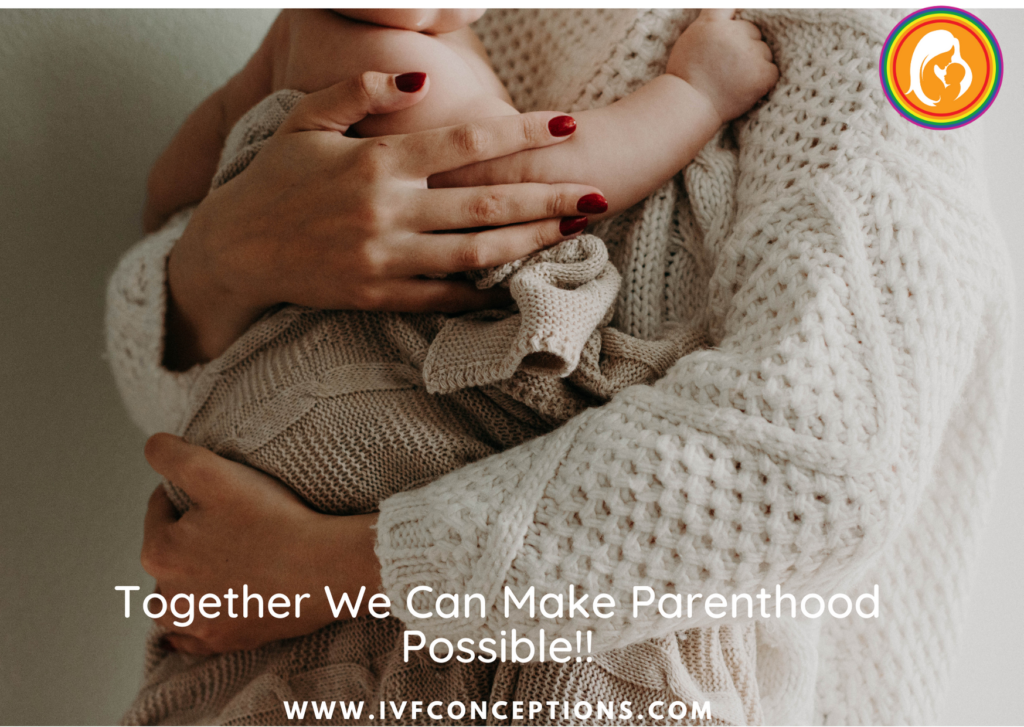When to Stop Trying for IVF and Go for Surrogacy: A Comprehensive Guide


For couples struggling with infertility, in vitro fertilization (IVF) is often the first step toward realizing their dream of having a biological child. However, IVF is not always successful, and after multiple failed attempts, many couples face a tough decision: When should they stop trying IVF and consider surrogacy?
Knowing when to shift from IVF to surrogacy can be overwhelming, but it’s essential to make an informed choice for the future of your family.
In this guide, we’ll help you understand the signs that it might be time to stop IVF treatments and explore surrogacy as a viable family-building option.
Begin your surrogacy journey with IVF Conceptions today!
Mobile: +91-8800481100 ( WhatsApp, Line, Viber)
Email: neelam@ivfconceptions.com
Understanding IVF and Surrogacy
What is IVF?
IVF involves combining eggs and sperm outside the body to create embryos. These embryos are then transferred into the woman’s uterus in the hope that they will implant and lead to a pregnancy.
What is Surrogacy?
Surrogacy is an arrangement in which a woman, known as a surrogate, carries and delivers a baby for another person or couple. The surrogate has no genetic relation to the baby in gestational surrogacy, as the embryo is created using the intended parents’ or donor’s eggs and sperm via IVF.


Key Indicators That It’s Time to Stop IVF
a) Multiple Failed IVF Cycles
After repeated IVF failures, many intended parents start questioning whether it’s worth trying again. Medical research shows that success rates decrease significantly after the third or fourth failed IVF cycle, especially if the underlying fertility issue hasn’t been resolved. Persistent failures, despite optimal embryo quality and good health, may indicate that the uterus is not conducive to pregnancy.
b) Diminished Ovarian Reserve or Poor Egg Quality
For women over 40 or those diagnosed with diminished ovarian reserve, the quality and quantity of eggs may be too low for a successful pregnancy. If you’ve undergone multiple egg retrievals with little to no success in creating viable embryos, it might be time to consider alternative options like surrogacy.
c) Medical Conditions that Prevent Pregnancy
Certain medical conditions, such as uterine abnormalities, fibroids, or recurrent miscarriages, can prevent successful implantation or carrying a pregnancy to term. For women with such conditions, even the highest quality embryos may not result in pregnancy. In these cases, surrogacy may be the best option for having a biological child.
d) Emotional and Physical Exhaustion
IVF treatments can be emotionally draining, and each failed cycle can lead to immense stress, anxiety, and disappointment. Physical side effects from hormone injections and medications can also take a toll. When the emotional and physical burden becomes too much, many intended parents decide that surrogacy offers a better path to parenthood.
e) Financial Considerations
IVF is expensive, and after multiple attempts, many couples find themselves running low on resources. When faced with the financial strain of further IVF cycles, surrogacy may be a more cost-effective option. While surrogacy itself comes with a high price tag, the chances of success are often higher with a gestational carrier, reducing the long-term financial burden.

 Medical Conditions Where Surrogacy Might Be the Better Option
Medical Conditions Where Surrogacy Might Be the Better Option
a) Uterine Factor Infertility
If you have been diagnosed with uterine factor infertility, such as uterine scarring (Asherman’s syndrome), a missing uterus (due to hysterectomy or congenital conditions like MRKH), or severe fibroids, achieving pregnancy through IVF may be impossible. Surrogacy offers a solution in these cases by allowing you to use your eggs (or donor eggs) to create a genetically related child.
b) Recurrent Pregnancy Loss
For women who experience multiple miscarriages despite successful embryo implantation, the emotional toll of continued IVF attempts can be overwhelming. Surrogacy offers the opportunity to avoid the trauma of recurrent pregnancy loss while still having a biological child.
c) High-Risk Health Conditions
If you have a health condition, such as severe cardiovascular disease or kidney issues, pregnancy may pose significant risks to your health. In such cases, surrogacy allows you to avoid the risks of carrying a pregnancy while still being involved in your child’s conception and birth.
4. Emotional and Psychological Readiness for Surrogacy
Deciding to stop IVF and pursue surrogacy is more than a medical decision—it’s an emotional and psychological one. Here are some signs that you may be ready:
- Acceptance of the Uterine Factor: You have come to terms with the fact that your body may not be able to carry a pregnancy.
- Comfort with the Surrogacy Process: You feel comfortable with the idea of another woman carrying your child.
- Desire for a Family: The desire to become a parent outweighs the need to carry the pregnancy yourself.
- Strong Support System: You have the support of your partner, family, and friends as you navigate the surrogacy process.

 Advantages of Surrogacy
Advantages of Surrogacy
Once you decide to transition from IVF to surrogacy, you’ll find several advantages that can bring relief and renewed hope.
a) Higher Success Rates
Surrogacy has higher success rates compared to IVF for women who have difficulty carrying a pregnancy. Gestational carriers are carefully screened for health, fertility, and overall suitability, improving the chances of a successful pregnancy.
b) Emotional Peace
After years of unsuccessful IVF attempts, surrogacy can bring emotional peace. Knowing that a healthy surrogate is carrying your baby can alleviate the stress and anxiety of multiple IVF cycles.
c) Biological Connection
For most couples, surrogacy allows them to maintain a biological connection to the child. This is especially important for those who have viable eggs or sperm but are unable to carry a pregnancy themselves.
d) Control and Involvement
In gestational surrogacy, intended parents remain actively involved in the pregnancy journey. You can attend medical appointments, receive regular updates, and be present during the birth.
Reasons for IVF failure
The most important factors of successful IVF treatment are good quality eggs, normal and functional sperm, and a healthy uterus to carry a child.
The problem with any one of these can lead to the failure of the IVF procedure.
- Poor quality of embryos One of the most frequent reasons why an IVF cycle fails is because of the embryo quality. After moving to the uterus several embryos are unable to implant because they are defective. Embryos looking safe in a laboratory can have defects that cause them to die rather than develop. The doctor might decide to do PGD, which is genetic testing to rule out any genetic abnormality in
- Quality of eggs – Although the woman’s age undergoing IVF plays an enormous part, the egg age is more significant. When a woman grows older, a woman’s eggs tend to deteriorate in quality and quantity. This would have a huge effect on her chances of pregnancy with and without IVF. The amount of mutation increases with age.
- Chromosomal abnormalities – Embryos that have chromosomal defects can cause IVF failure, whether they are born or formed naturally in a laboratory. Chromosomal defects are also the cause of IVF failure and miscarriages.
- Sperm abnormalities – While abnormal sperm tends to be a less common factor influencing an IVF cycle’s success, they nonetheless play a significant supporting role. Sperm isn’t just bumping into an egg and triggering fertilization. Instead, the fertilization process itself is very complex. To transfer sperm to the egg, it must be motile. If your sperm is non-motile it may lead to the failure of the IVF procedure. The sperm DNA fragmentations lead to lower fertilization.
- Lifestyle changes – Smokers also tend to conceive up to twice as many IVF cycles and are more likely to suffer a miscarriage. If you are overweight or underweight, you can try to achieve a healthier weight to improve the likelihood of IVF treatment being successful.
More resources on this topic:
Cause of infertility in females and treatment options
All you need to know about male infertility
How many IVF cycles should I go for before opting for surrogacy?
There are no particular times you must go for an IVF treatment. In the past, most physicians discourage women from seeking IVF cycles after around 3 to 4 failed IVF cycles using their sperm and eggs. These are especially disturbing for women with each cycle producing no eggs— or producing only two or fewer embryos then.
But new research found that after six or more IVF cycles, about two-thirds of patients would be successful. Such findings applied in particular to women under 40.
So, there is no particular limit as to how many cycles you must go for. But, do keep in mind the time and resources you have before proceeding with the other IVF cycles.
What other options do I have except IVF?
IVF is one of the finest and most commonly used ART techniques. But it is not the only one to be used. Many other ART techniques can be used by fertility specialists for the optimum outcome of IVF success. Of course, which options to choose for which intended parents depend on the individual case.
- Egg Donation – When procedures such as IVF cannot benefit a couple, they may want to consider using IVF with donor eggs. Donor eggs— and sometimes donor embryos— help an infertile woman carry and give birth to a child. When you have any of these criteria you may be a candidate for donor eggs:
- If you are suffering from genetically transmitted diseases that you don’t want to pass on to your child.
- When you have suffered from premature ovarian failure.
- When your egg quality is diminishing.
- Gestational Surrogacy – Gestational surrogacy is another procedure that is helpful to people who have gone through repeated IVF failures. In surrogacy, another woman (surrogate mother) carries and gives birth to a child for the couple (intended parents). A surrogate is of two types – gestational surrogate and traditional surrogate. A gestational surrogate is not biologically related to the child while a traditional surrogate is biologically related to the child.
When to Choose Gestational Surrogacy Over IVF
Here’s a simple guide to know if it’s time to choose surrogacy:
|
Situation |
When to Choose Surrogacy |
|
After Multiple Failed IVF Attempts |
If you’ve had 3 or more unsuccessful IVF cycles despite good embryo quality. |
|
Diminished Ovarian Reserve |
If your egg quantity/quality is significantly compromised. |
|
Medical Conditions Preventing Pregnancy |
If you have conditions like uterine abnormalities, Asherman’s syndrome, or recurrent pregnancy loss. |
|
Emotional and Physical Strain |
If IVF has become too emotionally or physically taxing, and surrogacy offers a less stressful alternative. |
|
Financial Limitations |
If further IVF cycles are becoming financially impractical, especially considering surrogacy’s higher success rates. |
Conclusion
Deciding when to stop trying for IVF and go for surrogacy is deeply personal and challenging. It’s important to consult with fertility specialists, therapists, and surrogacy agencies to guide you through the decision-making process. While IVF offers hope, surrogacy may ultimately be the path that brings you closer to your dream of parenthood.
If you’d like to learn more about IVF, Egg Donation, or surrogacy services globally, check out the rest of our website at IVF Conceptions. We offer legally secure and affordable surrogacy consulting services for FREE.
Begin your surrogacy journey with IVF Conceptions today!
Mobile: +91-8800481100 ( WhatsApp, Line, Viber)
Email: neelam@ivfconceptions.com

 FAQs: Transitioning from IVF to Surrogacy
FAQs: Transitioning from IVF to Surrogacy
1. How many IVF cycles should I try before considering surrogacy? Most fertility specialists recommend considering surrogacy after three to four failed IVF cycles, especially if there is no clear medical reason for the failures.
2. Is surrogacy more successful than IVF? For women who have trouble carrying a pregnancy, surrogacy generally offers higher success rates since gestational carriers are carefully screened for fertility and overall health.
3. Can I still use my eggs in surrogacy after failed IVF attempts? Yes, if your egg quality is good, you can use your eggs to create embryos for surrogacy. Otherwise, donor eggs are also an option.
4. How long does the surrogacy process take? The surrogacy process typically takes 12 to 18 months from finding a surrogate to the birth of the child.
5. How do I find the right surrogacy agency? Research agencies with a solid track record, read reviews, and consult with professionals who can guide you through the legal, medical, and emotional aspects of surrogacy.